|
|
During the Russo-Turkish wars of the last couple
of centuries of the Ottoman Empire's existence, Russia used any excuse to pick
on her weaker neighbor, "The Sick Man"... mainly in the hopes of
gaining access to warm water ports, through the Dardanelles. Well, here is an
episode of when the Ottomans shined... where one measly military force came
between mighty Russia and the conquest of the Turks' nation. Even though the
Turks technically lost the war, the Russians would have little or nothing to
show for their aggression — once Disraeli, the British statesman who was
friendly to the Turks, made sure to make mincemeat of the Russians' gains at
1878's Berlin Conference. (Plevna is part of Bulgaria today.)
|
|
|
| Professor
Mahmut Ozan Tells Us the Story: |
REMEMBERING "THE TURKISH TIGER WHO TAMED THE
RUSSIAN BEAR AT "PLEVNE"
(An Editorial)
Mahmut Esat Ozan
The Turkish Forum
AUGUST 30, THE VICTORY DAY
As it is every year, August 30 is the occasion when Turks celebrate
Many victories of the Turkish Independence War against the Greek invaders (1919-1922). In
past essays I had contributed stories of that sort. This year I am offering another
example of victory from the glorious Turkish history: THE SIEGE AND THE DEFENSE OF PLEVNE-
BY OSMAN PASHA THE HEROIC
TURKISH MILITARY GENIUS
The 500-year-long administration by the Turks of the region known as The Balkans
constitutes the most extensive period for one nation's ruling Of another, found in the
annals of world history. Ridiculed even today, This incredibly long period of governance
was accomplished not by terror as The contemporary European and Serbian writers want you
to believe, but by An almost magical formula of tolerance shown by the Ottoman Turks to
the
populace of the lands acquired in wars, and the freedom granted by them to the various
existing cultures to govern themselves the way they wanted. It was a new idea of
governance and it worked for five long centuries, covering a span of time beginning
roughly with the discovery of the New World and lasting up to the end of the American
Civil War. When the Ottoman Turks occupied these Balkan lands, the peasantry was subjected
to much lower taxes and work requirements than they had under their Previous Christian
landlords.
Even though the Ottoman Turks have been out of the Balkans for a long time, Bosnians today
are still representing the vestiges of that long nostalgic presence of theirs. The
descendants of the old Turkish colonizers can also be found today in Albania, Macedonia,
Kosovo, Greece and Bulgaria. It was in fact in an Ottoman territory which is known Today
as Bulgaria that one of the great occurrences of heroism the world has ever known took
place.
In the year l877, in a small Balkan village called Plevne a handful of
soldiers of a bedraggled army of Turks stopped cold the enormous forces of the Czar of
Russia. Just like the defenders of Sarajevo of a few years ago, they also were pinned-down
by a huge infantry surrounding them, being bombarded day and night by heavy artillery
positions from all sides. They were cut off from all civilization. They were sure to
perish in the sun-baked fields of their outpost with no ammunition, no supplies of any
kind, and above all, no food of any description.
Looking at recent situations in Bosnia, and in Kosovo, the
Unquestionable heroism of the Muslim population becomes doubly meaningful if one assesses
what's been happening there. With the indecisive, unfair policy of the Western powers in
clear view, one comes to the conclusion that the World must bow its head in deepest
respect to the inhabitants of Sarajevo as it had done for the heroic defenders of Plevne a
century earlier.
A former Yugoslav diplomat by the name of Civijeto Job, wrote the
following in a recent article published in a Belgrade-based Serbian
newspaper Vreme. "Whatever happens, the world must now bow in deepest gratitude to
Sarajevo and its heroic stand. For it has held up for many months a mirror in which the
world governments can see themselves. The picture is not reassuring."
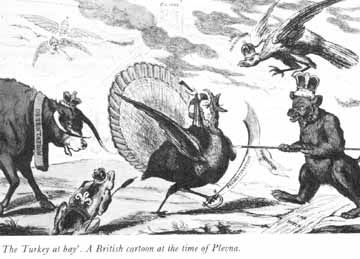
In l877, the Czar of the mighty Russian Empire, Alexander II was waging war upon the
Turks, determined to take over the country and come down to the all-important Dardanelles.
The war had been going on for some time. It was said that a once mighty Ottoman Empire was
now standing on its last legs. The Turkish General defending the outpost in the village of
Plevne in what is now Bulgaria, was General Osman, or Osman Pasha as he was
Known to the Turks. He would soon display a legendary heroism of epic proportions.
During the siege, Osman Pasha gathered his troops and his commanders And told them without
emotion, his pale blue eyes leveled on them, that the fate of the Ottoman Empire rested
now on their shoulders.
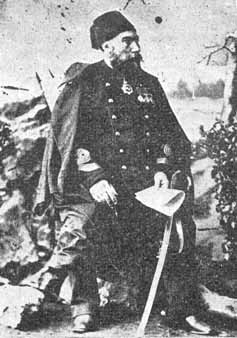 |
|
A rare photo
of Osman Pasha
|
"The Russians are good
soldiers," Osman Pasha told them. "They are brave, determined. But," he
added, "we beat them before. We will beat them again. On no account must you be
afraid of them. We will make them run again today.
But you must have confidence in me. Above all, you must have
Confidence in yourselves. Remember if we fail, our country dies."
The men present shouted: "We shall never forget that, Your Excellency."
"The blessings of Allah upon you, my sons," Osman Pasha said. "The
blessings of Allah upon you also, Your Excellency." As Osman Pasha turned and
galloped away, the men looked after him In hushed silence. Their eyes glistened with
adoration.
At 5:30 the next morning, the Russian General, Krudener, opened his assault on the Turkish
Army. Crouching in the bushes and the ravines, the Turks waited grimly for the command to
open fire. It came in the sound of a piercing bugle call. In a second, the soft, hushed
beauty of the morning exploded into a shrieking, insane chaos of war. All day long,
without let-up, this insanity continued.
The Turks succeeded to hurl back the Russian attacks one after another. An hour before
sunset, General Krudener finally was forced to call a Halt to the swiftly crumbling
Russian offensive. Defeated disastrously in every sector, the Russian dead totaled 4000
men. The first Russian attack had failed. That evening the correspondent of the Daily
Telegraph in London, sent a story to his paper about the amazing victory of Osman Pasha in
Plevne. He ended the article with this eulogy of the Turkish General. "Osman Pasha is
more than a great general. He is a great leader of men. When he orders an attack, he does
not say 'go' to his soldiers. He says 'come, follow me.'"
Giving himself no rest, Osman Pasha began to prepare for the next
Russian offensive. The battle of Plevne, he knew, had just begun.
A keen student of the American Civil War, Osman Pasha decided to fortify his positions
with earthen redoubts, a defensive tactic that had been greatly employed by the
Confederacy during the Civil War.
His men digging day and night, constructed two great redoubts on a ridge. They were
flanked on either side by rows of trenches. In spite of the fact that he was heavily
outnumbered by the enemy, Osman Pasha coolly withdrew 5,000 men completely from the battle
zone, concealing them in the hills to the south of Plevne. This strategy totally confused
the Russians. Attack after attack of theirs were repulsed by a small contingency of
Turkish soldiers.
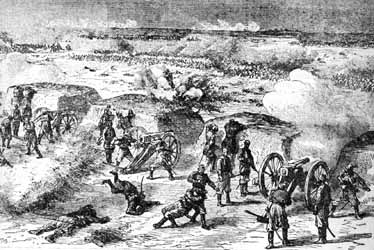
At the end of the battle more than 8,000 Russians lay dead on the
battlefield. It was a bad, bad day for the Russians. The brilliance
of Osman Pasha's leadership, combined with the staunchness of his troops not only
astonished Europe, but also helped dull the edge of anti-Turkish feeling that gripped the
Christian countries.
In England, the Prime Minister, Lord Disraeli harping on the theme that the Russian attack
on Turkey was a shameless act of conquest, found that people were suddenly, and finally,
showing interest in what he had to say.
In Turkey, just a week earlier, the collapse of the Ottoman Empire
Seemed imminent. But Osman's victory put new life into his people. It gave Them back their
pride, their honor. The Turkish general went on to tell his troops that the battle for
Plevne was not yet over, that he Russians were sure to return in far greater strength,
that the enemy needed Plevne more than it needed Constantinople or the Dardanelles.
It was a grim speech, but Osman's men, their faces full of pride, heard him out
unflinchingly. By September of that year, the Russians under a new commander, Prince
Skobeleff were ready to resume the battle for Plevne. Over l00,000 Russian soldiers, plus
l0,000 Romanian troops were poised For the word to attack.
Inside Plevne, Osman, his forces at the ready, was awaiting the enemy's assault. The
Turkish general was aware that there wasn't a military expert in Europe who gave him a
ghost of a chance against the Russians.
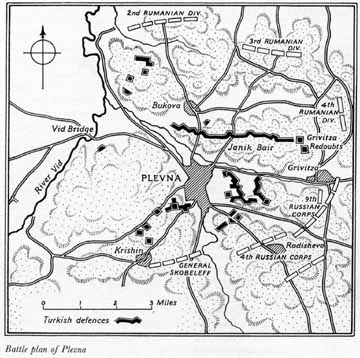
The great Russian assault began on September ll. Besides the forces under the command of
General Skobeleff, the two adjacent armies of General Zotoff and Kriloff surged forward in
a concerted drive on Osman's northwestern line. But the Turkish fire power proved to be
enormous. It stopped the Russians dead in their tracks. Within a matter of seconds, the
enemy had lost half of its attacking force. By the time the Russian reserves arrived on
the scene, the original attacking forces were in chaotic retreat.
That afternoon Skobeleff, at the head of 7,000 reserves rushed back to The
"Krishnin" redoubt. When he saw the Turkish Crescent and Star flying Over the
fortress, the Russian general let out a wild cry of pain. "All is lost," he said
"All is lost." Europe was electrified by the news of Russian defeat at Plevne.
People could hardly believe that the mighty Russian hordes had been defeated by a handful
of Turks. The name of Osman Pasha rang throughout the world.
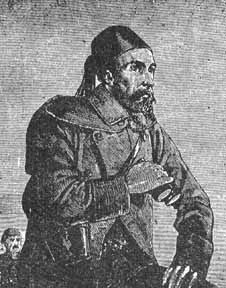 |
|
A great Turkish general
|
His leadership and his military genius made him
the man of the hour. Public sympathy heretofore strongly pro-Russian veered sharply to the
Turks. In Russia, a stunned and dejected Czar refused to let his Generals test their skill
against Osman Pasha any further. The Czar gave orders for Plevne to be starved into
submission.
Thousands and thousands of fresh Russian troops were brought to the Scene for the purpose
of encircling and blockading the little town.
Days followed into weeks, weeks, into months. The siege continued. Food and fuel supplies
quickly ran out in Plevne. Within the next few weeks, disease and hunger stalked the
little town. Misery was everywhere. The dead littered the streets. The living were forced
to eat the soles of their shoes to stay alive.
On November l3, the Grand Duke sent a personal letter to Osman begging him to surrender
"in the name of humanity."
Osman Pasha refused. The motley army that the Sultan put together from Syrians,
Palestinians and Circassians took to their heels at the first sight of the enemy soon
after their arrival from Turkey. Upon the rout of this army, Osman decided to make a
break-through of the Russian lines using the Turkish conscribes. His soldiers all declared
that they preferred it to an abject surrender.
On December l0 the last battle of Plevne occurred. It was a terrible
And sublime spectacle as a handful of Turks went marching on the double Across the plain
towards the massed Russian army.
Behind the heroes of Plevne rode their leader, Osman Pasha. In the
Face of devastating artillery barrage, Turks swept on like a whirlwind. Now with Osman in
the lead they smashed in and over the first two rows of Russian trenches. As the Turks
gathered for their third charge, a Stray bullet hit Osman Pasha and he suddenly toppled
from his horse. Believing that Osman was dead and not just wounded, the grief-stricken
Turkish soldiers were in disarray. The battle was already over.
At 1:00 p.m. the same day, Osman Pasha surrendered to the Russians. Skobeleff, who was
present at the historic moment, refused to receive The Turkish General's saber, and told
him: "You are a great general. You Have saved the honor and dignity of your
country."
Osman replied, "I know only that I have lost the war."
"No," replied Skobeleff, "I'm afraid you have won the war." Skobeleff
proved to be right. Osman Pasha had indeed won the war. All Europe was entranced by the
heroism of Osman Pasha and his men. All over the continent of Europe, especially in
England, hundreds upon hundreds of newborn babes were named after the Turkish general.
Osman Pasha, freed by the Russians the following year in l878, returned To a triumphant
reception in Istanbul. He was appointed the
Commander-in-Chief of the Imperial Guard, and the following year as the Minister of War.
He died in 1900, but in Turkey he will always be remembered as the "Turkish Tiger,
who tamed the Russian bear."
|
Orthodox Love
|
According to the Plevna chapter in Noel
Barber's sensationalistic and far from "favorable-to-the-Turks" 1974 book,
"The Sultans," which the author could not resist dedicating a whole
chapter on (deviating from the title's subject matter as it does), "partly
because it provides a superb example of the Turkish talent for bulldog defence, but
also (to be truthful) because it is such a rattling good yarn that I could not
resist it," here are the chapter's last two paragraphs:
A very different fate was reserved for the
soldiers of the line. Despite repeated Russians promises that prisoners would be
well treated, nearly 45,000 Turks were kept in the bitterly cold open air of Plevna
for nearly two weeks. They received virtually no food, drugs, medical aid; nor could
they even drink the water of the River Vid which was contaminated by hundreds of
corpses. Three thousand men died before the rest set off in the snow to various
internment camps. Of the 42,000 men who started, often barefoot, on the long march
to prison, barely 15,000 reached Russia. A fate as terrible awaited the seriously
wounded left behind by Osman. The Bulgarians, conveniently ignoring their promises,
dragged them from the hospitals and massacred every man.
One last and gruesome echo of the heroic
siege of Plevna appeared in, of all places, a Bristol newspaper. It consisted of one
paragraph that escaped general notice in England. In an article dealing with
fertilisers, it read simply: "Thirty tons of human bones, comprising thirty
thousand skeletons, have just landed in Bristol from Plevna."
|
| A
Turk is Displeased |
There are many ways the
Turks are diametrically out of line with their Oriental cousins, the Armenians... one of
the more dramatic being that the Armenians, like the Greeks and the Jews, have a great
sense of solidarity within their communities. Indeed, the Armenians often behave, in an
amazing way, as monolithically as a people can possibly be. In contrast, the Turks are in
their own little worlds... and I'm certainly an example of that myself, having nearly no
contact with other Turks. In other words, there is no sense of sticking together, which is
why Turks assimilate well in melting pot societies, while Greeks and Armenians usually are
Greeks and Armenians first (and, say,
Americans second.) Here, we learn of of a Turk who seems ashamed of what Professor Ozan
has written... through Professor Ozan's response.
|
|
Thu, 12 Sep 2002
TURK: WORK HARD, BE PROUD
OF YOUR PAST AND BE SECURE!
(An Editorial)
Mahmut Esat Ozan
The Turkish Forum
DIDN'T WE INHERIT THOSE
WORDS FROM OUR ATA?
The answer is a resounding "YES." Those eloquent words are inscribed on
monuments, the most visible one of them is located on the grounds of the 'Youth
Park' in Ankara, the capital of the modern Turkish Republic. That encouragement
spoken by the founder of the Republic, Kemal Ataturk, Says it all. To perpetuate
their priceless gift from their collective father, Turks have to work hard despite
all difficulties, learn to be proud of their past accomplishments, among them their
victories, and finally
rely on their military resources, to make them feel that they are secure within the
national borders of their country, believing that no foreign power will again dare
to humiliate them and try to take away from them their independence and their
sovereignty.
A few day ago when August 30th, the most important date on Turkish calendars, was
approaching, I felt like sitting down by my computer and writing an article about
that day. My inspiration came from the glorious siege of Plevne of 1877, whose
heroic exploits I had heard about from my mother and read about them later on in my
school books. It was truly a great victory, and I wanted to write about it. I
finished the essay and called it: "Remembering The Turkish Tiger Who Tamed the
Russian Bear at Plevne." Soon after my essay was distributed online by Turkish
Forum, I was rewarded with an avalanche of congratulatory messages, all of which
were extremely gratifying to me, and I'm sure to the Turkish Forum.
For a whole week I did bask in the glow of these true manifestations of happiness
and serendipity. However, they all came to an end yesterday when someone signing his
or her name as A. Sezginis sent the following to me in care of Turkish Forum. TF did
not distribute this letter. Nevertheless, I would like to do it myself, because
there is a lot to be learned from the mentality of similar thinkers. Here's that
letter:
I READ YOUR ARTICLE "TURKISH TIGER". DO YOU REALLY BELIEVE THAT IT WILL
HELP US TO BRAG ABOUT OUR PAST MILITARY VICTORIES TO FACE TODAY'S PROBLEMS? WHEN
FEELINGS ARE STIMULATED IT SHOULD BE LEAD TO SOME DIRECTION. I WOULD LIKE TO KNOW
WHAT YOUR PURPOSE IS.
I was stunned with such an admonition and chastisement coming right After a flood of
laudatory messages I had received for the very same article earlier during the same
week. These words had come to me as a chilling shock. This was as if someone had
dumped over my bare head a bucket of ice-cold water in the middle of a dark and
frigid wintry night. I was speechless for a while. What had I done wrong to arouse
this person's
ire? Was it wrong to commemorate one's heritage, talk about and celebrate the
victories of one's country ?
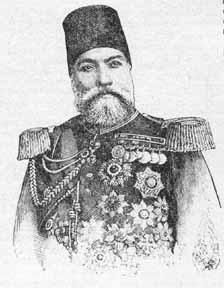 |
|
Osman Pasha in later years
|
My initial decision was to ask one or two
persons whose beautiful words Of jubilation about the same essay concerning the
legendary military greatness of Osman Pasha to give an answer in my defense. This
was the Turkish general whose fame had spread beyond the borders of the Balkans and
the Ottoman Turkey and had percolated into all of Europe. His super
human military dexterity and prowess was so overwhelming that for years Christian
mothers in Europe had chosen this Muslim name of 'Osman' for their children. Those
names still exist today all over Europe in a variety of different spellings.
WHAT WAS WRONG FOR BEING PROUD OF OUR PAST?
After having recovered from the initial jarring impact of this person's unusual
words, I decided to give an answer the best way I could. I composed the following
passage for my reader, A.Sezginis:
Dear fellow Turk, first I thank you for having read my essay and for
having taken the time to comment on it. In my many years of
professorial life, my decade-long authorship in America's only English language
newspaper, the Turkish Times, and as an online columnist at Turkish Forum in the
last five years, I had a chance to conclude that it is virtually impossible to
please everybody every time. Neither among my students nor among my readers did I
encounter a unanimous agreement on what I had
said or written. I always accepted any and all disagreements made in a reasonable,
civilized fashion. I accept yours too in that way.
You said "I read your article "Turkish Tiger." Unfortunately, that
was Not the title. Your placing an apostrophe after the word Tiger and making those
two words the title, you did not perhaps understand the importance of my purposely
chosen heading. The essay was not about a zoological specimen. It was not only
"Turkish Tiger." It was: "REMEMBERING THE TURKISH TIGER WHO TAMED THE
RUSSIAN BEAR AT "PLEVNE." I am not being 'finicky' here. There is a
difference between the two, and you seem to have missed that nuance, albeit a small
one.
This however, was the least of what worried me in your approach. You continued with
more strident words when you said: "Do you really believe that it will help us
to brag about our past military victories to face today's problems?"
What I wrote was to commemorate the 30th of August Victory Day, "Otuz Agustos
Zafer Bayrami, " I could not understand your objection to a Thing like that.
The Victory Day of the 30th of August has been celebrated in Turkey and in every
Turkish Consulate and/or Embassy grounds in the world. Turks and the friend of the
Turks congregate in those places for the purpose of celebrating the national and
traditional victories of Turks
and their heritage. To protect this ethnic heritage, Turks had shed their precious
blood on many occasions in the past. By the gates of Vienna, on the shores of the
Danube river , on the mountains and valleys of Kosovo, in the Balkans, and on many
other European, African and Asiatic topography. I hope that you do not refute these
verities!
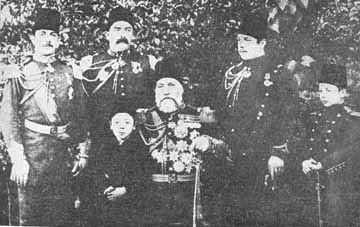 |
|
An
aged Osman Pasha, with his sons
|
Your reminding
me that Gazi Osman Pasha's victory had nothing to do With the problems we were
facing today in the world did not make any sense, because the two notions are
mutually exclusive, one from the other. What are the problems to which you are
alluding ? Were you referring to the Middle East? Were you referring to the attempts
made for the Eradication of the remnants of the Al Queda? Was there a hidden code in
your Questions that neither I nor anyone else could decipher?
Do you think that what I did was so unusual ? Hundreds of writers in all parts of
the world who want to celebrate the Turkish victories find it to be their duty to
talk about those glorious moments. These are reminders to all Turks that despite all
odds to the contrary, they had won against their adversaries in the Balkans and in
other parts of the world fighting against the unacceptable military attacks of the
British, French, Russian, Italian, Greek invaders, and against a large contingency
of a treacherous, back-stabbing Armenian populace of the Eastern Anatolia . Your
ancestors and mine had succeeded in achieving unbelievable victories while a
stupefied world watched them with a hidden envy and an out-and-out jealousy. They
had done that before, and that was in Plevne. That city today is Plowdiv, Bulgaria.
Your last paragraph may win the cake. You chastised me by saying: "When
feelings are stimulated it should be lead (your own spelling) to some
direction." You further go on and demand an answer when you say: "I would
like to know what your purpose is."
MY PURPOSE IS TO INFORM
There should be nothing unusual for Turks to want to remind the present generation,
as well as the future ones, that they were determined to win against the perfidious
machinations of all internal and external enemies of Turkey. They feel that it is
only natural to do so and remind every detractor of theirs that they will never
again let any enemy try to tear their "Anatolia" to pieces. To celebrate
the victory of the 30th of August is nothing more or nothing less than that.
I am confident that you agree with all that I enumerated for you so
far. To reiterate the previous point, this traditional national
commemoration has been continuing ever since 1923. In case you still cannot bring
yourself to agree that Turks have the right to celebrate and brag about those
victories then I have nothing to say to you anymore. However, several letters
praising what I wrote place you in a minority.
During one of last Sunday's political shows, a U.S Congressman declared that when he
wanted to propose a resolution for September 11, to be enacted as an American
national holiday, one of his colleagues, an American of Serbian heritage opposed the
idea. His explanation was that the Serbs have been using that date to commemorate
the Ottoman Turks' conquest of Serbia on September 11, 1459. This indicates that
some people commemorate even their losses. Why in the world then should some Turks
be ashamed of celebrating their victories?
|
| |
|
|